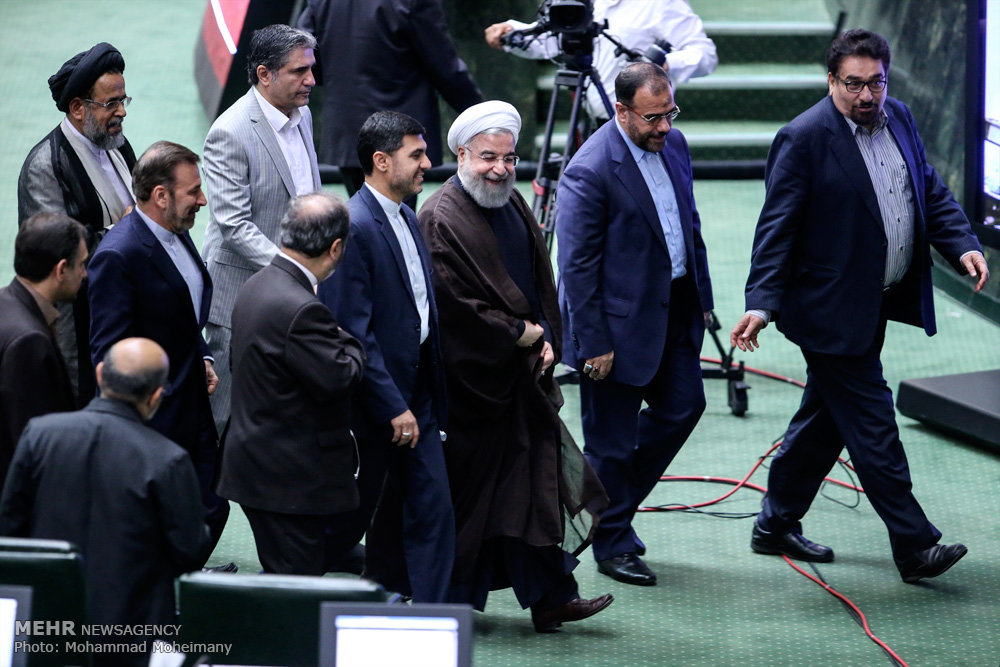Rouhani defends ministers, vows structural reforms

TEHRAN – President Hassan Rouhani went to the parliament on Tuesday for a long hearing on his priorities in his second four-year term, defending his ministerial roster and pledging “structural reforms” and “daring decision-making”.
“The government is resolute to bring about more structural reforms in its second four-year term,” Rouhani said in his two-hour long speech.
“The government will decide daringly yet tactfully and with foresight… purposeful realism, decision-making on the basis of human being’s experience and knowledge, and learning from past mistakes.”
An entourage of ministerial picks and Vice President Es’hagh Jahangiri were accompanying the sexagenarian president.
Last week Rouhani released the names of 17 nominees for ministerial posts to Majlis for approval, delaying one appointment for unknown reasons.
Rectifying structural loopholes, Rouhani emphasized, had been “less attended to” by the previous administrations which reveled in oil revenues as a nostrum for weaknesses.
Rouhani was referring mainly to the presidency of Mahmoud Ahmadinejad for two terms when oil prices soared up to an all-time high of $140 yet virtually no tangible change in the country was made.
Reforms are unavoidable for one reason, inter alia, the president added. “Oil revenues at least in the incoming years won't’s be so big to play the sedative role it used to play.”
An alternative is to increasingly fall back on “sustainable sources of income” such as taxation, Rouhani noted.
“We seek to introduce reforms into the country’s taxation system… cutting tax exemptions and widening tax coverage can cause more efficiency.”
In 2016, Iran collected some $19.3 billion in taxes, up 16 percent compared to 2015, according to official statistics.
Currently, Iran is grappling with challenges in its banking system, state budget, retirement funds, water and environment, according to Rouhani.
“Failure to pay due attention to the depth of the issues now can damage big achievements of the Islamic Republic of Iran in other areas,” he warned.
Inefficient banking has been partly preventing Tehran from reaping full benefits of the international nuclear deal struck with world powers in 2015.
“The government will press ahead with its banking reform plan steadfastly,” Rouhani said.
Rouhani also said the incoming government will do its best to fight corruption and to assure that citizenship rights are upheld, adding that his ministerial picks are the best fits for the fulfillment of the government’s intended goals.
Rouhani’s comments were followed by a number of lawmakers debating the proposed plans and ministerial picks.
Mohammad Reza Sabaghian opposed the new cabinet in its entirety, expressing doubt over its capabilities.
Sabaghian said the country’s inflation rate is high and the new administration will be facing severe economic problems, urging a clearer master plan.
One of Rouhani's achievements during the first term was to lower inflation from 45 percent down to less than 10 percent.
Hamidreza Fouladgar, another lawmaker against Rouhani’s proposed ministers, questioned the new cabinet’s ability to cope with huge economic challenges.
He emphasized that the country is facing unemployment, problematic banking system and issues surrounding state budget and the environment.
Heshmatollah Falahat Pisheh spoke in favor of the cabinet, expressing support for the majority of the proposed ministers.
Falahat Pisheh called for more unity between the new administration and the parliament to avoid problems between the two bodies.
Another supporter of the entirety of the new administration was Mohammad Reza Aref, who praised the Rouhani administration for its successful first term. Aref said in order for the administration to succeed, unity and agreement are needed.
The lawmaker also said providing free access to information is a must for fighting corruption.
Vice President Jahangiri also defended the performance of Rouhani’s first administration, calling its record “shining”. He also said the newly proposed cabinet ministers are “capable and accountable”.
Leave a Comment